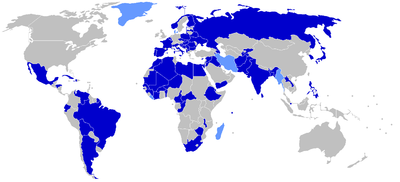- Convention for the Suppression of the Traffic in Persons and of the Exploitation of the Prostitution of Others
-
The Convention for the Suppression of the Traffic in Persons and of the Exploitation of the Prostitution of Others is a resolution of the UN General Assembly. The preamble states:
"Whereas prostitution and the accompanying evil of the traffic in persons for the purpose of prostitution are incompatible with the dignity and worth of the human person and endanger the welfare of the individual, the family and the community"
It was approved by the General Assembly on 2 December 1949 [1] and came into effect on 25 July 1951. In 2007, seventy-four states were party to the convention (see map). Additionally, five states had signed the convention but had not yet ratified it.
The Convention [2] requires state signatories to punish any person who "procures, entices or leads away, for purposes of prostitution, another person, even with the consent of that person", "exploits the prostitution of another person, even with the consent of that person", run brothels or rent accommodations for prostitution purposes. It also prescribes procedures for combating international traffic for the purpose of prostitution, including extradition of offenders.
Furthermore, Member States are required to abolish all regulations that subject prostitutes "to special registration or to the possession of a special document or to any exceptional requirements for supervision or notification".
The Centre for Human Rights, specifically the secretariat of the Working Group on Slavery, in close co-operation with the Centre for Social Development and Humanitarian Affairs of the Department of International Economic and Social Affairs actively monitors this resolution.
The definition of trafficking of this convention was departed from in the Trafficking protocol to the United Nations Convention against Transnational Organized Crime.[3]
See also
- Trafficking in human beings
- Sexual slavery
References
External links
Categories:- Child sexual abuse
- Prostitution
- United Nations conventions and covenants
- Treaties concluded in 1949
- Treaties entered into force in 1951
- Child labour treaties
Wikimedia Foundation. 2010.

